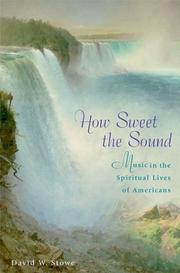| Listing 1 - 5 of 5 |
Sort by
|
Book
ISBN: 0807878006 9780807878002 9781469603247 1469603241 9780807834589 0807834580 1469606879 9781469606873 Year: 2011 Publisher: Chapel Hill University of North Carolina Press
Abstract | Keywords | Export | Availability | Bookmark
 Loading...
Loading...Choose an application
- Reference Manager
- EndNote
- RefWorks (Direct export to RefWorks)
In this cultural history of evangelical Christianity and popular music, David Stowe demonstrates how mainstream rock of the 1960's and 1970's has influenced conservative evangelical Christianity through the development of Christian pop music. For an earlier generation, the idea of combining conservative Christianity with rock--and its connotations of nonreligious, if not antireligious, attitudes--may have seemed impossible. Today, however, Christian rock and pop comprises the music of worship for millions of Christians in the United States, with recordings outselling classical, jazz, and New Age...
Contemporary Christian music --- Popular music --- Evangelicalism --- Music, Popular --- Music, Popular (Songs, etc.) --- Pop music --- Popular songs --- Popular vocal music --- Songs, Popular --- Vocal music, Popular --- Music --- Cover versions --- CCM (Contemporary Christian music) --- Christian contemporary music --- Christian music, Contemporary --- Christian popular music --- Evangelical popular music --- Jesus music --- Popular music, Christian --- Gospel music --- Sacred vocal music --- History and criticism. --- Religious aspects. --- Musique populaire chrétienne --- Musique populaire --- Evangélisme --- History and criticism --- Religious aspects --- Histoire et critique --- Aspect religieux
Book
ISBN: 9780190466831 0190466839 9780190466855 Year: 2016 Publisher: New York Oxford University Press
Abstract | Keywords | Export | Availability | Bookmark
 Loading...
Loading...Choose an application
- Reference Manager
- EndNote
- RefWorks (Direct export to RefWorks)

ISBN: 0674012909 Year: 2004 Publisher: Cambridge, Mass. London Harvard University Press
Abstract | Keywords | Export | Availability | Bookmark
 Loading...
Loading...Choose an application
- Reference Manager
- EndNote
- RefWorks (Direct export to RefWorks)
Book
ISBN: 0674858255 Year: 1994 Publisher: Cambridge ; London Harvard University Press
Abstract | Keywords | Export | Availability | Bookmark
 Loading...
Loading...Choose an application
- Reference Manager
- EndNote
- RefWorks (Direct export to RefWorks)
Book
ISBN: 0190466855 0190466863 0190466847 Year: 2016 Publisher: New York, NY : Oxford University Press,
Abstract | Keywords | Export | Availability | Bookmark
 Loading...
Loading...Choose an application
- Reference Manager
- EndNote
- RefWorks (Direct export to RefWorks)
Oft-referenced and frequently set to music, Psalm 137 -- which begins "By the rivers of Babylon, there we sat down, yea, we wept, when we remembered Zion"--Has become something of a cultural touchstone for music and Christianity across the Atlantic world. It has been a top single more than once in the 20th century, from Don McLean's haunting Anglo-American folk cover to Boney M's West Indian disco mix. In Song of Exile, David Stowe uses a wide-ranging, interdisciplinary approach that combines personal interviews, historical overview, and textual analysis to demonstrate the psalm's enduring place in popular culture. The line that begins Psalm 137 -- one of the most lyrical of the Hebrew Bible -- has been used since its genesis to evoke the grief and protest of exiled, displaced, or marginalized communities. Despite the psalm's popularity, little has been written about its reception during the more than 2,500 years since the Babylonian exile. Stowe locates its use in the American Revolution and the Civil Rights movement, and internationally by anti-colonial Jamaican Rastafari and immigrants from Ireland, Korea, and Cuba. He studies musical references ranging from the Melodians' Rivers of Babylon to the score in Kazakh film Tulpan. Stowe concludes by exploring the presence and absence in modern culture of the often-ignored final words: "Happy shall he be, that taketh and dasheth thy little ones against the stones." Usually excised from liturgy and forgotten by scholars, Stowe finds these words echoed in modern occurrences of genocide and ethnic cleansing, and more generally in the culture of vengeance that has existed in North America from the earliest conflicts with Native Americans.
| Listing 1 - 5 of 5 |
Sort by
|

 Search
Search Feedback
Feedback About UniCat
About UniCat  Help
Help News
News